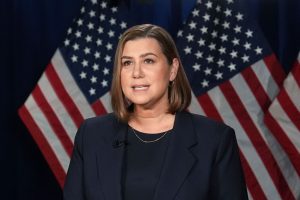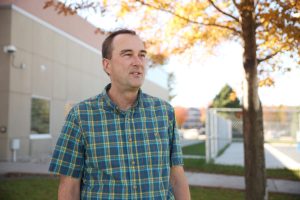
Sen. Josh Hawley, R-Mo., at the U.S. Capitol on November 20, 2024. (Photo by Chip Somodevilla/Getty Images)
WASHINGTON — U.S. Sen. Josh Hawley of Missouri praised the addition of radiation exposure compensation funds in the Senate version of the costly “one big beautiful” budget reconciliation bill that extends and expands tax cuts and reduces funding from social safety net programs.
Hawley, a Republican, said Friday the proposed revival and expansion of the fund for Americans in Alaska, Arizona, Colorado, Kentucky, Missouri, Nevada, New Mexico, North Dakota, South Dakota, Tennessee, Utah, Wyoming and the Navajo Nation marks a “tremendous day for the people of Missouri and for nuclear radiation survivors across the country.”
“This is a chance, finally, to make it right,” Hawley said on a call with reporters.
“All of this is caused by the federal government’s negligence in its testing program and its disposal program, where repeatedly the government, over the years, exposed citizens unwillingly and unwittingly to nuclear radiation,” Hawley said.
Lawmakers on the Republican-led Senate Committee on the Judiciary included the bipartisan legislation in the panel’s text for the massive budget reconciliation bill, which the panel released Thursday. Hawley is a member of the committee.
The complex budget process combines legislation from 10 Senate committees and only requires a simple majority to get through the chamber.
If approved by the Senate, lawmakers in both chambers would then need to reconcile their separate versions. The House version does not include a reauthorization of the radiation exposure fund.
Radiation exposure fund
The Radiation Exposure Compensation Fund, often called RECA, was established in 1990 and pays one-time sums to those who developed certain diseases after working on U.S. nuclear tests and to those who lived in counties downwind from test explosion sites in Arizona, Nevada and Utah.
Uranium industry workers who were employed in 11 states who subsequently developed qualifying diseases also qualify.
The U.S. conducted more than 1,000 atomic weapons tests from 1945 to 1992 — the first at the Trinity Test site near Alamogordo, New Mexico, where the U.S. tested the atomic bomb during the Manhattan Project prior to dropping the weapons on Hiroshima and Nagasaki, Japan, at the end of World War II.
The Department of Justice administered the fund before it ended in June 2024, and by June 2022 had approved $2.3 billion in benefits.
The Senate overwhelmingly passed the bipartisan bill in March 2024 but it died in the House.
If the lawmakers approve the legislation as part of the budget reconciliation package, the fund would reach areas including in Alaska, Kentucky, Missouri and Tennessee, where communities were impacted by radioactive waste dumping, uranium processing and other activities surrounding the testing.
The bill would also expand downwind areas to include Colorado, Idaho, Montana and New Mexico and increase the one-time compensation sums to victims or surviving family members up to $100,000.
Dawn Chapman, a Missouri advocate for radioactive waste cleanup and co-founder of Just Moms STL, told reporters on the Friday morning call that generations in the St. Louis area have suffered “extreme amounts of devastation in the form of illnesses.”
“If you take a hard look at our bipartisan RECA family as we call ourselves, you’ll see that we are made up of so many different backgrounds, so many different communities, so many different faiths,” she said.
“And we understand politically right now that there’s a lot going on with this big package. We’re just hopeful that this is the one thing in this bill that everybody will agree is a great thing, and not touch and leave it in there and let us have our justice and peace.”
Negotiations ongoing
Republicans have wrangled with limiting the price tag of the mega-bill as they aim to carry out President Donald Trump’s campaign promises of extending and expanding tax cuts, which cost roughly $3.9 trillion according to the Committee for a Responsible Federal Budget.
To offset the massive costs, the House-passed version cuts social safety net programs and clean energy incentives.
By changing eligibility requirements and what Medicaid can cover, the House bill would reduce federal spending on health provisions, including the government health insurance program for low-income individuals, by roughly $902 billion, according to the nonpartisan Congressional Budget Office.
It would also tighten eligibility and shift to states costs of the Supplemental Nutrition Assistance Program or SNAP, resulting in a $285.7 billion reduction in federal spending, according to CBO.
The bill would also eliminate $249 billion in clean energy investment and production tax credits over the next decade.
With Senate negotiations in full swing, CBO released an analysis last week revealing the overall bill would add $2.4 trillion to the national deficit over 10 years.
A separate CBO analysis also found the House version would tilt in the favor of higher earners and overall decrease resources for low-income Americans.
Hawley, who vows he won’t support cuts to Medicaid in the Senate version, said Friday he’ll continue that stance, even with the added price tag of the RECA fund.
“Not cutting Medicaid benefits is hugely, hugely important for me, (and) making sure rural hospitals don’t close. Half of the hospitals in Missouri are rural. I don’t want to see any of those closed, so I am in hourly contact with leadership in negotiations on this,” he said.
Hawley is also pushing to significantly increase the child tax credit to $5,000, up from the temporary $2,500 in the House version. He did not comment directly on the call when a reporter asked whether the increased child tax credit remained a priority for him in the mega-bill.





